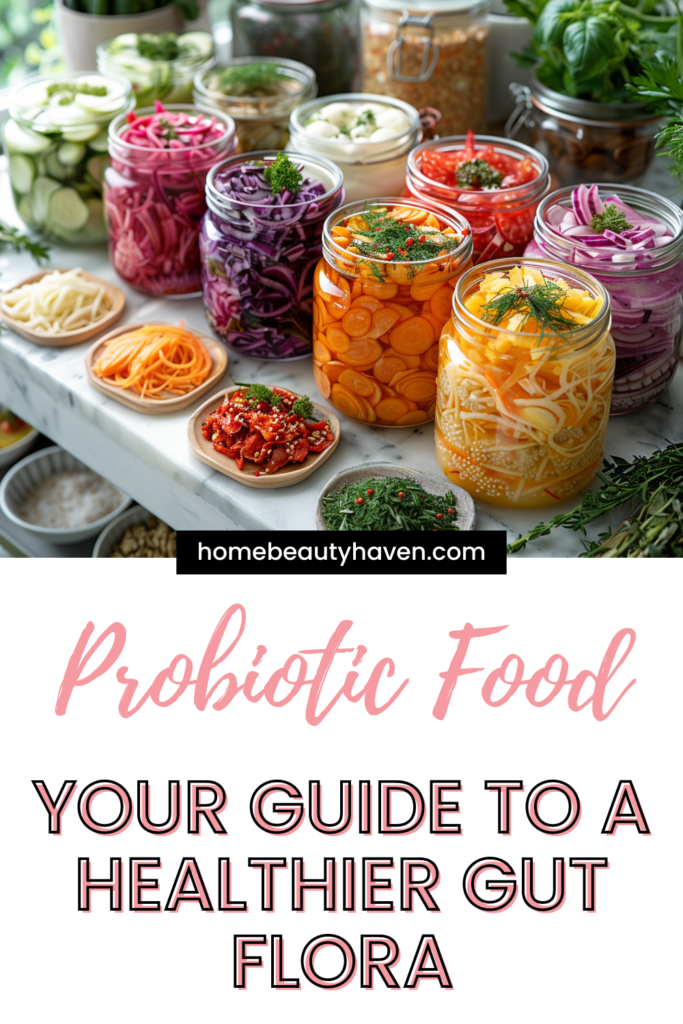
Probiotic Foods: Your Guide to a Healthier Gut Flora
Probiotic foods are gaining popularity as a cornerstone of a healthy diet, prominently due to their role in promoting gut health. These edibles are rich in live microorganisms, often referred to as beneficial bacteria, which can offer a myriad of health benefits when consumed in adequate amounts. These beneficial bacteria are crucial for maintaining a balanced microbiome, the community of microorganisms living in our bodies. A diverse and thriving microbiome has been linked to improved digestion, enhanced immune function, and overall well-being.

Fermented foods are typical examples where probiotics naturally occur. Items such as yogurt, kefir, sauerkraut, kimchi, and kombucha have been part of human diets for centuries, valued for both their flavors and health-promoting properties. During the fermentation process, bacteria or yeast convert sugars into other compounds, resulting in the characteristic tangy taste and increased numbers of live microorganisms. Through their fermentation journey, these foods become rich in probiotics, which, when ingested, can help reinforce the gut’s population of good bacteria.
Understanding the importance of gut health has been a key driver for research on probiotics and fermented foods. An optimal gut microbiome plays a pivotal role in not just digestion but also supports the immune system. It has become increasingly clear that what we eat can significantly influence the composition of our gut bacteria, which in turn impacts our overall health. As a result, incorporating probiotic foods into one’s diet is seen as a proactive approach to nurturing one’s health from the inside out.
Understanding Probiotics and Their Sources
Probiotics are live microorganisms that confer health benefits when consumed in adequate amounts. This section considers the variety of foods rich in probiotics, their health advantages, and how they compare to prebiotics.
Types of Probiotic Foods
Probiotic-rich foods include fermented dairy products like yogurt, kefir, and cultured buttermilk. Non-dairy options such as sauerkraut, kimchi, miso, tempeh, and natto are also excellent sources. Beverages like kombucha, kvass, and tepache provide liquid alternatives. Cheeses, especially aged varieties, and sourdough bread are other probiotic foods, but it’s important to choose those labeled with live and active cultures.
Health and Nutritional Benefits
Consuming probiotic foods has been linked to improved gastrointestinal symptoms and enhanced digestive health. They are known to support immune function and may have a positive impact on mental health due to the gut-brain axis. Certain strains of probiotics like Lactobacillus and Bifidobacterium can aid in maintaining heart health and lowering blood pressure. Their anti-inflammatory effects and contribution to the synthesis of B vitamins are additional nutritional benefits.
The Role of Fermentation
Fermentation is a process in which microorganisms, such as bacteria, yeasts, and especially lactic acid bacteria, convert sugars into alcohol or acids. For example, Lactobacillus transforms sugars into lactic acid in yogurt and kefir, creating ideal conditions for these beneficial live bacteria to thrive and proliferate.
Probiotics vs. Prebiotics
Probiotics are different from prebiotics, which are non-digestible dietary fiber that feeds gut bacteria. Foods rich in prebiotics include garlic, onions, and asparagus. Combining prebiotics and probiotics in a diet can have synergistic effects on promoting a healthy gut microbiota.
Choosing and Using Probiotic Supplements
When selecting probiotic supplements, look for the CFU (colony-forming units) count indicating the level of live bacteria. It’s essential to consult a doctor before adding them to your regimen, especially if you have health conditions or are on medication. Safety and efficacy should be a priority, and since not all supplements are regulated by the Food and Drug Administration (FDA), it’s crucial to choose products from reputable sources.
Probiotic Foods in Health Management
Probiotic foods play a crucial role in health management by contributing beneficial bacteria that strengthen various bodily functions, from digestion to mental health.
Digestive Health and Disorders
Consuming probiotic foods can balance the gut microbiome, which is vital for a healthy digestive system. In particular, they can alleviate symptoms of irritable bowel syndrome (IBS) and inflammatory bowel disease (IBD), including bloating and gastrointestinal symptoms. Regular intake can also help restore the microbiome after antibiotic treatment, potentially reducing antibiotic-associated diarrhea.
Immune System Support and Disease Prevention
Probiotics enhance the body’s immune system by improving gut health, a primary defense mechanism against infections. They may reduce the incidence of the common cold, support the management of infectious diarrhea, and play a role in preventing chronic diseases, including certain types of cancer and heart disease. Safe and natural, these foods serve as a preventive tool against various health issues.
Mental Health and Mood Regulation
Mental health correlates strongly with gut health due to the gut-brain axis. Probiotic foods can influence this relationship, potentially easing symptoms of depression and anxiety. The effects of probiotics on mood regulation highlight the significance of diet in managing mental health conditions.
Weight Management and Metabolism
Evidence suggests probiotic foods may impact weight management and help combat obesity. By affecting the metabolism, these foods assist in managing body weight and can be a part of a weight loss strategy. This is due to the interaction between beneficial bacteria and the host’s metabolism.
Allergies and Inflammatory Responses
The regular consumption of probiotic foods is associated with alleviating symptoms of allergies, such as eczema, and reducing overall inflammation. They may regulate the body’s inflammatory responses, contributing to a healthier immune response to allergic triggers.




